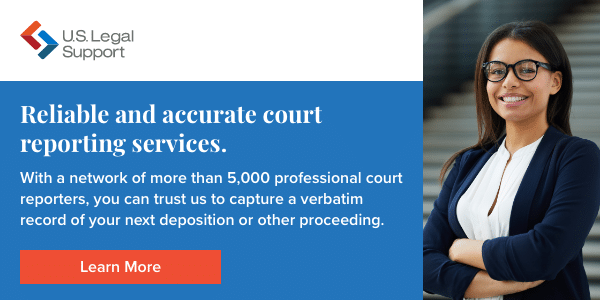

A verbatim, accurate transcription is critical for depositions, trials, and other legal proceedings. The word choice of a single witness or attendee can affect a negotiation and settlement, trial strategy and outcome, witness impeachment, or even future law based on precedent.
Court reporters and legal transcriptionists both play a key role in producing these important documents—whether for trials and depositions or in business or other settings—but the professions are distinctly different.
Let’s take a look at legal transcriptionist vs court reporter in terms of responsibilities, environments, and skill sets.
Transcribing is the process of converting spoken words to a text document, and it’s a mainstay within the legal profession as well as several other industries that require formal documentation of meetings or events.
There are many types of legal transcription, but the three most important aspects of legal transcription are:

Court reporting is one of the oldest professions. Once ancient civilizations came up with the concept of a trial, officiants understood the need for a formal record of testimony, questions, and outcomes.
Spoken language is significantly faster than writing words—especially when you go all the way back to inscribing on clay tablets, but even a fast typist on today’s computers isn’t fast enough.
Shorthand systems solve this challenge, allowing court reporters to capture phrases, words, and phonetic sounds rather than individual characters. Today, these systems include devices such as a stenotype machine or voice writer combined with software that converts device input to written text.
While court reporters generate transcripts, they also have an active role in official legal proceedings. A professional, skilled court reporter is trained to:
Court reporting and legal transcription services have some overlap, however, attorneys and law firms still use both types of professionals to get their work done.
Here are some basics about court reporters:
Court reporters are usually certified based on their methodology from one of these organizations:
However, how to become a legal transcriptionist is different and may require the following:
Who you hire depends on your needs, so be clear in communicating what you require if you work with an agency or provider to secure a transcriptionist or reporter.
Engage a court reporter if you need a court official who can:
Alternatively, a legal transcriptionist is ideal to:
Now that you understand the difference, are you ready to arrange a transcriptionist or court reporter for your next legal proceeding?
For nearly 30 years, U.S. Legal Support has provided litigation support services including court reporting and transcription from our pool of professionals across the country. Plus, we offer record retrieval and analysis, litigation consulting, interpreting and translation services, and more.
Contact our team to discuss your transcription, court reporting, and other litigation support needs.
Sources:

Julie Feller is the Vice President of Marketing at U.S. Legal Support where she leads innovative marketing initiatives. With a proven track record in the legal industry, Juie previously served at Abacus Data Systems (now Caret Legal) where she played a pivotal role in providing cutting-edge technology platforms and services to legal professionals nationwide.
![]()
Content published on the U.S. Legal Support blog is reviewed by professionals in the legal and litigation support services field to help ensure accurate information. The information provided in this blog is for informational purposes only and should not be construed as legal advice for attorneys or clients.